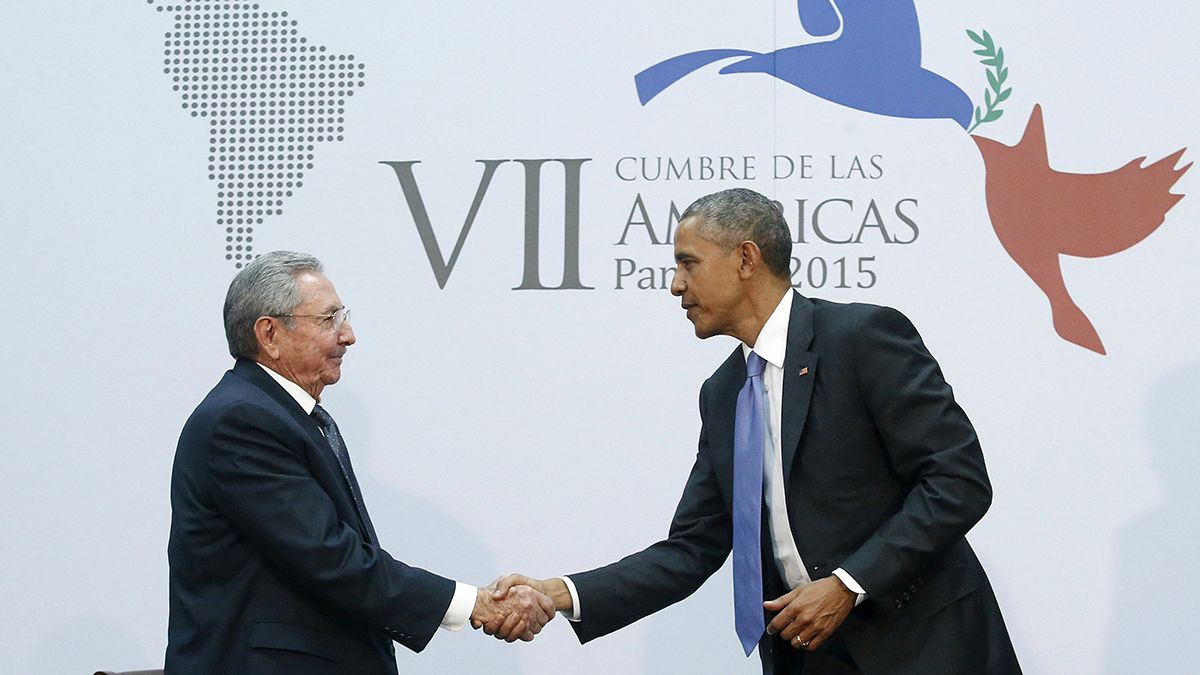Presidents Barack Obama and Raul Castro have made history by holding the first formal, face to face talks between leaders of the United States and
Presidents Barack Obama and Raul Castro have made history by holding the first formal, face to face talks between leaders of the United States and Cuba in over half a century.
Meeting at the Summit of the Americas in Panama, they agreed to press ahead with improving relations.
After decades of hostility, key differences remain – but the focus is now on the future.
“My message here is that the Cold War is over,” Obama told reporters after the meeting.
“I think we have to be very clear. Cuba is not a threat to the United States.”
He also stressed: “We are not in the business of regime change. We are in the business of making sure that the Cuban people have freedom and the ability to participate and shape their own destiny and their own lives, and supporting civil society.”
At their 80-minute meeting on Saturday, Obama and Castro sat side by side in polished, wooden chairs in a small conference room. The mood was cordial but businesslike.
Both wore dark suits and each nodded and smiled at some of the comments made by the other in brief statements to reporters before they began their talks.
Obama said later: “We have very different views of how society should be organised and I was very direct with him that we are not going to stop talking about issues like democracy and human rights and freedom of assembly and freedom of the press.”
Castro condemned past US attempts to topple communist rule on Cuba but said he was open to discussing human rights and he praised Obama, calling him an ‘honest man’.
“I see as a positive step his recent statements that he will quickly decide to remove Cuba from a list of countries that sponsor terrorism – on which we should never have been included,” Castro
said in a lengthy speech to the summit which brings together leaders from North, Central and South America.
“We are willing to discuss everything, but we need to be patient, very patient. Some things we will agree on; others we will disagree,” said the 83-year-old leader, who took over as president of Cuba in 2008 when his older brother, Fidel Castro, stepped aside because of ill health.
Castro and Obama agreed in December to move to normalise relations, including seeking to restore diplomatic ties that were broken off by Washington in 1961.
Obama said he decided to overturn longstanding US policy on Cuba because the old approach of open hostility and economic sanctions had failed to force through major changes on the island and it was time to try something new.
Since then, he has relaxed some restrictions on travel and trade with Cuba.
Raul Castro has undertaken some market-style reforms to try to strengthen Cuba’s economy but has made clear that there will be no end to communist rule.
The last time leaders of the two countries held a substantive meeting was in 1956, when Dwight Eisenhower was US president and Fulgencio Batista was the US-backed dictator in power in Havana. That meeting was also in Panama.
Cumbre de Panamá, julio de 1956. Presidentes Fulgencio Batista (Cuba) y Dwight Eisenhower (EEUU). 59 años han pasado. pic.twitter.com/HPQtplNib7
— Historia de Panamá (@HistoriaPTY) April 7, 2015
The Castro brothers toppled Batista in a revolution on January 1, 1959 and relations between the United States and Cuba quickly deteriorated.
Fidel Castro became a Cold War ally of the Soviet Union and the rivalries took the world to the brink of a nuclear war during the Cuban Missile Crisis in October, 1962.
Since 1977, the two countries have maintained contact through interests sections in Havana and Washington and in recent years they have cooperated on migration, drug trafficking and other issues.
#Cuba attends #SummitoftheAmericas for the first time. Look back at US-Cuba relations: http://t.co/aktIyPEJZ3 Reuters pic.twitter.com/oH6CQqwpjo
— CFR (@CFR_org) April 11, 2015
Now that relations are improving, Obama is close to removing Cuba from a US list of countries that it says sponsor terrorism.
Castro’s government has called Cuba’s inclusion on the list a hindrance to restoring diplomatic ties.
A senior US official said Obama will make his decision in coming days and that efforts to reopen Cuban and US embassies should be concluded relatively quickly.
Obama can continue to ease specific sanctions but the President and his Democrats know that the trade embargo against Cuba can be overturned only by the Republican-controlled Congress.
¡Hasta luego, presidente Obama! Viaja de regreso a EEUU en el Air Force One. #CumbrePanamápic.twitter.com/sxOaBdz502
— U.S. Embassy Panama (@USEmbPAN) April 12, 2015
